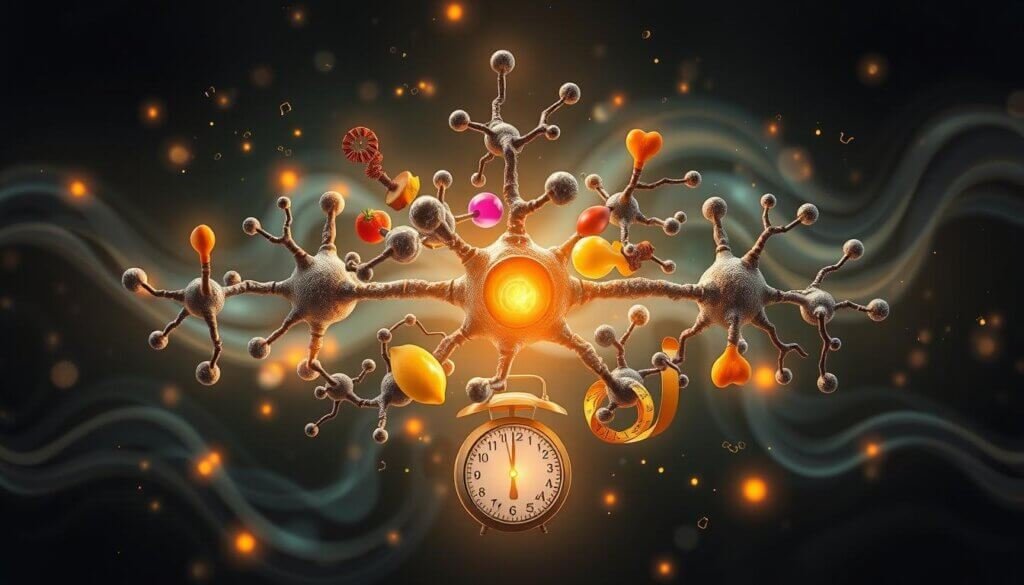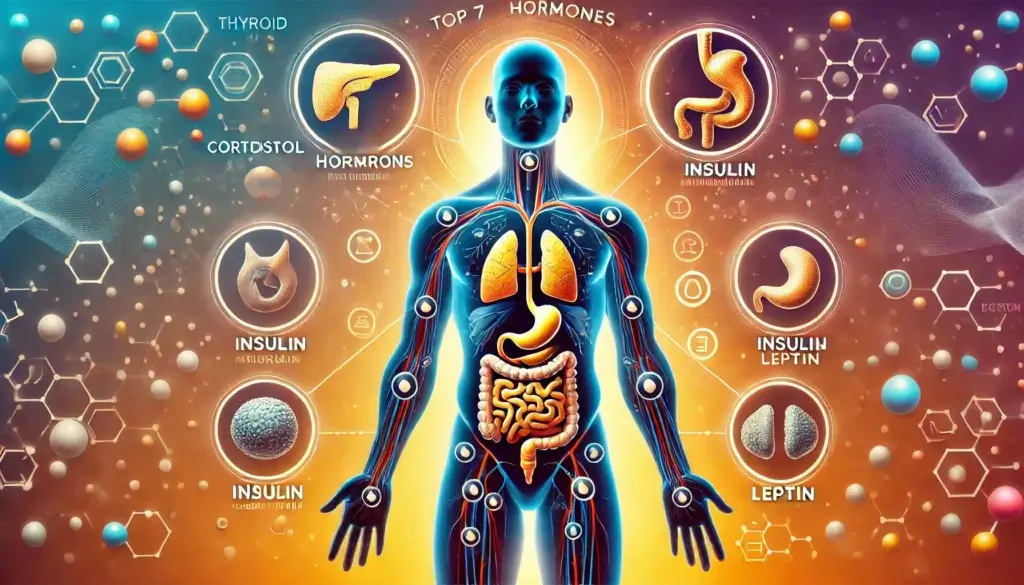80% of uchealth adults in the U.S. struggle with weight gain caused by hormones. And so it highlights the importance of hormones in fat burning and health. Key hormones are essential for anyone who is serious about fat loss.
In this article, we will explore the 7 hormones that could be holding you back from weight loss! You’ll hear about insulin, which stores fat, and cortisol, which goes up when you’re stressed. Knowing which hormones contribute to these functions will enable you to correct imbalances and harness your metabolic potential.

Key Takeaways
- Hormonal imbalances are a major contributor to weight gain and difficulty losing fat
- Understanding the role of key hormones like insulin, cortisol, and thyroid hormones is crucial for effective weight management
- Addressing hormonal issues can unlock your body’s natural fat-burning potential
- Identifying and correcting hormonal imbalances is a critical step in achieving your long-term fat loss goals
- A holistic approach that addresses both diet and lifestyle factors is essential for restoring hormonal balance
Understanding Hormonal Weight Loss Issues
Shedding weight can be a complex journey, and hormonal imbalances often play a crucial role. Understanding the science behind hormonal weight gain is the first step towards regaining control of your health and fitness goals.
The Science Behind Hormonal Imbalance and Weight Gain
Your body’s hormones regulate many processes, like metabolism and fat storage. When these hormones are out of sync, it can lead to significant weight fluctuations. This makes it challenging to achieve your desired results.
How Hormones Control Your Metabolism
Hormones like thyroid, insulin, and cortisol manage your metabolism. An imbalance in these hormones can slow down your calorie-burning potential. This leads to weight gain despite your best efforts.
Key Signs of Hormone-Related Weight Problems
- Unexplained weight gain or difficulty losing weight
- Stubborn belly fat or “muffin top” that won’t go away
- Fatigue, mood swings, and difficulty concentrating
- Irregular menstrual cycles or fertility issues
- Difficulty sleeping or poor sleep quality
If you’re experiencing any of these symptoms, it’s essential to consult with a healthcare professional. They can evaluate your hormonal profile and develop a targeted plan to address the underlying issues.
“Hormonal imbalances can be a significant obstacle in your weight loss journey, but with the right approach, you can regain control and achieve your health and fitness goals.”
Insulin: The Fat Storage Hormone's Impact on Your Weight
Insulin is one of the principal players in weight gain. It keeps blood sugar in check, but if it’s out of whack, it can wreak havoc. Insulin and weight Feat imagebanner3 Is insulin secreted as a response to food?
Insulin instructs your body to store glucose as body fat. It causes cells to resist the effects of insulin at high levels. That causes glucose to build up, becoming fat, leading to weight.
But, you can make your insulin sensitivity better and control your weight. Whole, unprocessed foods help control blood sugar and insulin. Regular exercise, especially resistance exercise, enhances insulin sensitivity and metabolism.
Insulin: How It Makes You Gain weight and How to Lose Fat Through Lifestyle Changes. Healthy insulin levels are crucial for achieving your weight and body shape goals.

| Factors that Influence Insulin Levels | Effect on Weight |
|---|---|
| High-carbohydrate, sugary diet | Increased insulin production, leading to fat storage |
| Sedentary lifestyle | Decreased insulin sensitivity, contributing to weight gain |
| Stress and lack of sleep | Elevated cortisol levels, which can disrupt insulin balance |
| Certain medications (e.g., corticosteroids) | Potential interference with insulin function and weight management |
By addressing factors that affect insulin levels, you can support your weight loss efforts. This helps maintain a healthy weight over time.
Cortisol: How Stress Affects Your Body Composition
Stress plays a big role in your weight loss journey. When you’re stressed a lot, your body makes more cortisol. This hormone can make it hard to lose fat, especially around your waist.
Managing Stress for Better Hormone Balance
To keep your hormones in check and help with fat loss, managing stress is key. Here are some effective ways to do so:
- Try relaxation techniques like deep breathing, meditation, or yoga
- Make sure to get enough sleep and stick to a routine
- Do regular exercise, but avoid very intense workouts that raise cortisol levels
- Find activities that help you relax, like going for a walk or doing something you love
Natural Ways to Lower Cortisol Levels
There are natural ways to lower cortisol levels and aid in hormonal weight loss:
- Eat foods with adaptogenic herbs like ashwagandha, rhodiola, and holy basil
- Take omega-3 fatty acids, which can help reduce cortisol
- Use deep breathing or meditation to relax
- Keep a regular sleep schedule and rest well
Exercise and Cortisol Connection
Exercise is good for you, but too much can raise cortisol. This can undo the good of your workouts. Stick to moderate exercises like brisk walking, light cycling, or strength training. Make sure to rest well between sessions.

By knowing how cortisol affects your body and managing stress, you can control your hormonal weight loss. This will help you reach your goals.
Thyroid Hormones: The Metabolism Masters
Your thyroid gland is central to your metabolism. It turns food into energy. Hormones released from the thyroid, such as T3 and T4, aid your body in burning calories, which can aid in maintaining a healthy weight. When these hormones are out of balance we can struggle to lose fat.
Hypothyroidism is when your thyroid does not produce enough hormones. This leads to weight gain — and makes it hard to lose weight. On the other end, hyperthyroidism results in an excess of hormones and causes undesired weight loss. Recognizing the signs of thyroid problems, such as tiredness and dry skin, is crucial.
Eat a balanced diet to maintain a healthy thyroid and to help control weight. It should contain iodine and selenium. Get active too and control your stress levels. If you suspect you have a thyroid problem, consult a doctor for assistance.
Want more insights? Check out our Fitness Blog for expert tips on Hormone Health & Weight Loss, fitness for Busy Lifestyles, Vegan Slim diets, Gut Health improvement, and Mindful Eating practices!
FAQ
What are the key hormones that can sabotage your fat loss goals?
Key hormones affecting weight loss include insulin, cortisol, thyroid hormones, estrogen, testosterone, leptin, and growth hormone.
How do hormonal imbalances lead to weight gain?
Hormonal imbalances can mess with your metabolism and how you store fat. They also affect your hunger. Knowing how these hormones work is key to losing weight.
What is the role of insulin in weight gain?
Insulin helps control blood sugar and stores fat. Insulin resistance can cause more fat, especially around the belly. Keeping blood sugar balanced is vital for losing fat.
How does stress and cortisol affect body composition?
Stress and high cortisol levels can mess with your hormones. This can lead to more belly fat and muscle loss. Reducing stress and living healthy can help manage cortisol.
What is the relationship between thyroid hormones and weight?
Thyroid hormones control your metabolism. If your thyroid isn’t working right, you might gain weight. Getting your thyroid checked and treated is important for losing weight.
How do estrogen and testosterone imbalances impact weight?
Estrogen and testosterone affect how your body looks. Too much estrogen or too little testosterone can cause weight gain. Fixing these imbalances can help with weight loss.
What is the link between leptin resistance and weight gain?
Leptin controls hunger and fat storage. Leptin resistance makes you hungry and gain weight. Improving leptin sensitivity is important for losing fat.
How can growth hormone affect your body composition?
Growth hormone helps keep muscle and body shape healthy. Not enough growth hormone can lead to more fat and less muscle. Boosting growth hormone through lifestyle can help with weight management.

